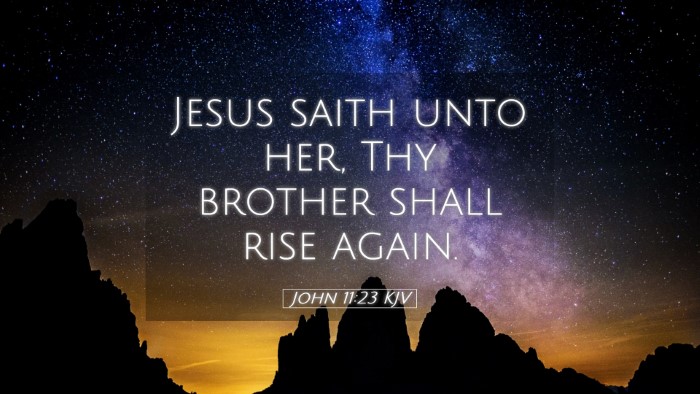Commentary on John 11:23
Verse Text: “Jesus said to her, ‘Your brother will rise again.’” (John 11:23, ESV)
Introduction
John 11:23 occurs in the context of the narrative surrounding the death of Lazarus. This passage is critical not only for understanding the miracle that follows but also for revealing the depth of Jesus’ compassion and the theological implications of resurrection. The insights drawn from public domain commentaries provide a rich foundation for understanding this pivotal moment in Jesus’ ministry.
Contextual Analysis
This verse comes shortly after Lazarus has died, and Martha, his sister, approaches Jesus with her grief and questions. The weight of loss is palpable in the conversation, and verse 23 serves as a profound moment of both comfort and prophetic promise.
Commentary Insights
Matthew Henry's Commentary
Matthew Henry emphasizes that Jesus’ assurance about Lazarus' resurrection presents a core doctrine of Christian faith—the hope of resurrection. Henry points out the significant role of faith in Martha’s understanding of Jesus’ promise, noting how she reflects both despair and yet a vague faith about the future return of the righteous at the last day. He argues that Jesus seeks to strengthen Martha's faith, guiding her from understanding a distant resurrection to realizing the immediacy of His power.
Albert Barnes' Notes on the Bible
Albert Barnes reinforces the importance of the phrase "will rise again", indicating that it reflects the Jewish belief in the resurrection of the dead. Barnes explains that Jesus is not merely offering a theological statement; he is declaring His own authority over death. He highlights how this conversation illustrates Jesus’ dual role as both comforter and miracle worker, transcending Martha's expectations.
Adam Clarke's Commentary
Adam Clarke provides a detailed look at the cultural background, noting that Martha's approach to Jesus indicates the common Jewish belief that the righteous would rise at the end of time. Clarke adds depth by discussing the emotional intensity of Martha’s faith, which eagerly awaits future resurrection but struggles with present grief. He emphasizes that Jesus’ reassurance not only pertains to Lazarus but hints at His identity as the Resurrection and the Life, showcasing the relational aspect of Jesus' ministry in human suffering.
Theological Implications
This verse encapsulates profound theological truths concerning Christ's nature and His power over life and death. The assurance that Lazarus would rise signifies a preview of Jesus' own resurrection and affirms the future hope for all believers. It emphasizes that Jesus is the embodiment of resurrection—He not only raises the dead but is the source of resurrection life.
- Resurrection Promise: The promise made to Martha encapsulates the Christian certainty of eternal life.
- Personal Relationship: Jesus’ engagement with Martha illustrates the importance of a personal relationship with Christ that nurtures faith amidst trials.
- Comfort in Grief: This moment offers a model for how to comfort those in grief, pointing to the ultimate hope found in Christ.
Practical Applications
For pastors, theologians, and students, John 11:23 is a rich source of encouragement and understanding to convey in pastoral care or scholarly discussion:
- Conveying Hope: Highlight the hope of resurrection in sermons and teaching, especially within contexts of mourning. Jesus’ declaration serves as a reminder that death is not the end for believers.
- Faith in the Present: Encourage congregants to nurture faith that interfaces with their current struggles, as Martha did—by expressing her doubts alongside her hopeful anticipation.
- Modeling Compassion: Emphasize the importance of being present with others in their time of grief, following Jesus’ example of empathy and relational engagement.
Conclusion
John 11:23 shines as a beacon of hope within the Christian narrative. By synthesizing insights from Matthew Henry, Albert Barnes, and Adam Clarke, we gain a holistic understanding of this verse's implications—encouraging faith amidst suffering, emphasizing Jesus' authority, and reaffirming the promise of resurrection. For every believer, scholar, and pastor, the truths unveiled in this commentary serve as foundational pillars in the journey of faith and ministry.


